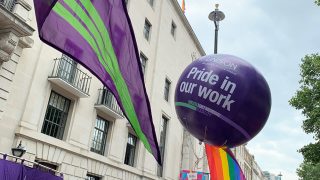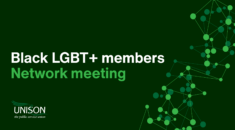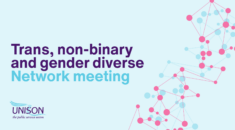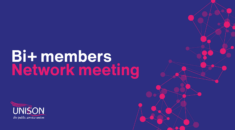Have you seen Pride?
This brilliant new British film tells the moving story of how a group of lesbian and gay activists made history, by supporting the 1980s miners strike and raising money for a small community of miners in south Wales. It also tells a broader story of the union movement and its place in changing society for the better – of how solidarity between people in need, in the hardest times, can make a difference to the lives of not just individuals, but whole communities.
So, what is a union anyway?
Trade unions are groups of employees who join together to maintain and improve their conditions of employment and, as depicted in the film, so much more.
UNISON is made up of 1.3 million people who work in our vital public services, from health and education to local council services and more. As a union we have the strength and security to tackle problems, and to contribute to a better society.
The National Union of Mineworkers (NUM) is the main union depicted in the film. During the course of the 1980s strike – aimed at stopping closures of coal mines that would tear the heart out of communities built around them – the NUM was not just an organiser of strikers. It worked in a number of different ways:
- Helping workers: The union supported miners pushed into poverty by the strike with collections and distributions of money and food;
- Supporting communities: Member-organised union socials were central to the lives of the community and kept morale up for people who were losing their earnings and had no work day-to-day.
- Managing campaigns: The NUM’s national leadership – especially its leader, Arthur Scargill – led a political campaign against Margaret Thatcher’s policies;
- Fighting for the rights of all: The NUM’s support for lesbian and gay rights after the strike led to these rights being enshrined in the Labour manifesto. The next Labour government introduced laws that brought full equality closer.
How have things changed?
The mid 1980s were exciting times for lesbian and gay rights. There were pockets of activists speaking out, including in UNISON’s former partner unions. At that time, you could be sacked just because you were lesbian or gay.
Now we’ve won many legal rights and it’s not just pockets of activists. UNISON lesbian, gay, bisexual and transgender members meet locally, regionally and nationally across our union and are involved in everything UNISON does.
You can’t be sacked just because of your sexual orientation now, but our work isn’t over. Bullying and harassment are still all too common and LGBT services are disappearing up and down the country.
Union membership – as vital as ever.
Everyone can benefit from being in a union, and it’s just as important for LGBT workers to be in a union today as it was in the 1980s. It’s clear from the film and it is clear to us in UNISON – we are stronger together.
In recent years unions have campaigned for and won: a national minimum wage; improved parental leave provisions; equality legislation; laws on reasonable working hours; minimum holiday and sickness entitlements; health and safety in the workplace; pension provision and more. And we have more to do.
Sounds great. How can I participate?
Join a union.
If you work in public services, or for a private company providing public services, you can join UNISON. If you work for another type of organisation have a look at this list of Britain’s unions to find one you can join.
Have your say on 18 October .
The UK is gearing up for the biggest demonstration this decade, on Saturday 18 October, when we will show the government that we won’t stand for poverty pay any longer. Unions across the country are joining forces to demand Britain get’s a pay rise. Join us and be part of something huge.





